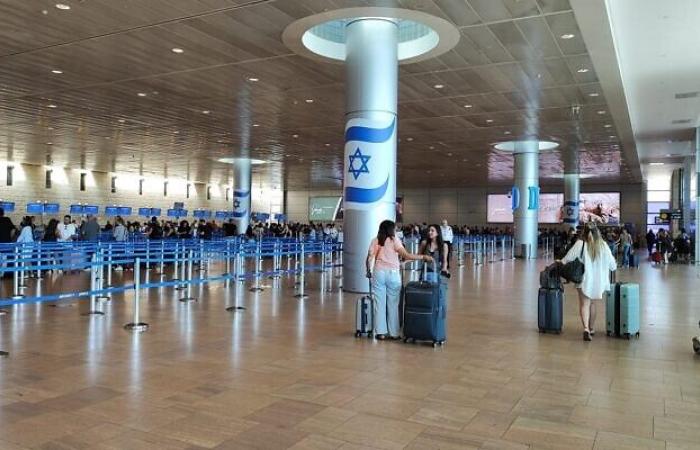Liad Agmon is CEO of Insight Partners, a New York-based private equity firm that has invested in more than 100 Israeli start-ups and technology companies. On the plane back from New York to Tel Aviv in late October, Agmon found himself surrounded by high-profile Israeli investors and founders, and the main topic of discussion was frustration over the shortage of banknotes. aircraft, high fares and the need to transfer some operations and personnel abroad.
“At a meeting of the board of directors [le mois dernier]we told the CEO of one of our companies that we expected him to move to the United States and build a team there as soon as possible,” Agmon wrote on social network X.
“It’s a conversation that’s happening in more and more companies today. »
Receive our daily edition for free by email so you don’t miss the best news. Free registration!
Agmon, a true entrepreneur, shared this insight in response to venture capitalist Michael Eisenberg’s outrage over the dire business travel situation for entrepreneurs, executives and their employees in Israel, which is disrupting their operations and their development plans and which is sure to have a negative impact on the country’s economy.
Since the war broke out when some 6,000 Gazans including 3,800 terrorists led by Hamas stormed southern Israel on October 7, 2023, killed more than 1,200 people, mostly civilians, kidnapped 251 hostages of all ages, and committed numerous atrocities and using sexual violence as a weapon on a large scale, foreign airlines have repeatedly canceled and resumed flights to and from Israel. In recent months, U.S. airlines have completely stopped serving Israel due to wars between Israel and the Palestinian Hamas and Lebanese Shiite Hezbollah terrorist groups and Iran and rising tensions in the Middle East.
Earlier this week, American Airlines announced it was extending the suspension of flights to Tel Aviv from March 2025 to September, as Israel steps up its response to Hezbollah’s near-daily rocket and drone attacks, including on the center of Israel, and a – a second attack from Iran.
Michael Eisenberg, co-founder and partner of Israeli venture capital firm Aleph. (Credit: Aleph VC)
Delta Airlines and Britain’s British Airways have canceled routes to Israel until April next year, joining a series of foreign airlines that have recently extended the suspension of their flights. Israeli airlines, namely El Al, Arkia and Israir, all continued to serve Israel during the war, only canceling flights when Ben Gurion Airport or Israeli airspace closed.
“If you have to go to New York next week, there isn’t even a waiting list you can get on, regardless of class, economy or business,” laments Eisenberg.
“A contractor called me to inform me that he had moved his sales manager and two other support staff to work overseas because there are no places available and that flights are expensive when they have to meet clients and attend international conferences. »
As co-founder of Tel Aviv-based venture capital firm Aleph, Eisenberg manages $850 million in assets. The venture capital fund has invested in more than 60 companies, including Lemonade, Melio, Windward, Simply, Honeybook and Empathy.
“Flight suspensions have become more permanent and, at the same time, there are fewer and fewer opportunities for investors to come to Israel and for founders and CEOs to meet investors because there are no has no thefts,” Eisenberg told the Times of Israel.
“Over the past 60 days, we have seen executives and other staff members have had to leave the country because they simply cannot get to their clients. »
This is because the Israeli tech industry does not have a “local market, so flight availability is the most important thing for tech companies to operate from Israel,” he said. added Eisenberg.
Maayan Shahar, director of strategic partnerships at UST Spark Israel, noted that due to limited flight availability, many Israeli executives are now taking longer distances when traveling and staying abroad longer for their work.
Maayan Shahar, director of strategic partnerships at UST Spark Israel. (Credit: Q Elite Beauty)
“Some companies have accelerated their processes due to the situation, meaning the CEO or salespeople moved this year instead of in 2025 or later,” Shahar said.
Israel attracts most of its technology investments from abroad, with the US market representing the main market for expansion. Around 80% of venture capital investments in local high-tech start-ups have been generated by foreign funds in recent years.
The dependence of the economy on the sector of high-tech has increased considerably in recent decades. The technology industry contributes about a fifth of local GDP, up from 6.2% in 1995, and accounts for more than 50% of total exports, while its employees generate a third of the tax revenue collected by the government, according to data from the Israel Innovation Authority.
Like many around them, Eisenberg and Agmon express disappointment with the government’s lack of action to encourage and support foreign airlines to resume flights to Israel.
“What’s incredible is that it’s not war, it’s not the controversial judicial overhaul [proposée en janvier 2023]”It was the incompetence of not being able to get the airlines to fly here that caused the Israelis to leave,” Eisenberg said.
“It’s a loss of tax revenue for the country and a missed opportunity to create big businesses here. »
Eisenberg directly called on Transportation Minister Miri Regev and Economy Minister Nir Barkat to act and “do what it takes to lift the siege,” but to no avail.
“One thing the government should have done is deal with the thefts. And what worries me is this level of incompetence which is dangerous for our economy and our prosperity because more and more businesses will expand outside of Israel,” he warned.

On the blue sign: “No democracy, no high-tech”; and on the yellow sign: “No to the coup”, in Tel Aviv, January 24, 2023. (Credit: Maya Alleruzzo/AP)
Asked what the government could do to make business travel easier, Eisenberg suggested “deciding whether to provide guarantees to foreign carriers or chartering more planes and adding more flights by local carriers, including including to destinations in Europe where there are connections with the United States, which is the main market for the high-tech industry.
But Israel’s tech ecosystem isn’t waiting for the government to take action.
The Israeli headquarters of the high-tech – a forum of entrepreneurs and start-up founders, investors and venture capital fund managers – proposes an initiative to operate a seasonal airline with leased planes and crews to strengthen the connection between Tel Aviv and New York, which is expected to begin in January and continue until at least the end of March.
The tech executives forum is in talks to operate a total of 36 direct weekly flights that would depart at midnight from Israel and land at Newark Airport early in the morning on weekdays, with one flight departing on weekends.
“We are experiencing a prolonged shortage of flights and there is currently no solution for those who need to travel to the United States, while prices are very high,” said the headquarters of the Israeli high-tech company.
“We decided not to wait for solutions from the Ministry of Transport and to produce them ourselves. »
“We plan to open this possibility to the general public and hope to be able to start selling tickets through travel agencies at fair prices, similar to those of pre-war flights to the United States,” added the forum.
The headquarters of the high-tech was created as part of the protest movement that unfolded early last year, when tech workers took to the streets to protest the government’s widely controversial plans to radically change the justice system . It is led by technology executives, including Erez Shachar, co-founder of Qumra Capital, and executives from technology and investment companies such as Papaya Global, Mellanox, Pitango, monday.com, Wix, Yotpo and Fireblocks.








